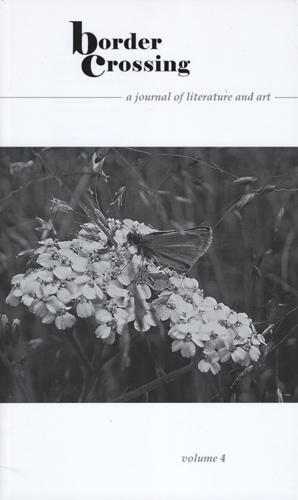Border Crossing – Fall 2014
Smaller journals are vulnerable to becoming just another magazine in the ever-expanding literary world. It is up to the individual journals themselves to find a way to separate their art from the countless others in circulation. Border Crossing, now four issues old (founded in 2011), appears to embrace this challenge and continues to deliver high-quality work while experimenting with unique features such as their “Michigan and Ontario” section. Smaller journals are vulnerable to becoming just another magazine in the ever-expanding literary world. It is up to the individual journals themselves to find a way to separate their art from the countless others in circulation. Border Crossing, now four issues old (founded in 2011), appears to embrace this challenge and continues to deliver high-quality work while experimenting with unique features such as their “Michigan and Ontario” section.
This issue wastes no time in grabbing reader’s attention. Colleen Abel’s poem: “The You Alphabet” speaks to the power someone or something can have over one’s mind. Lines 12-14 in the middle of the poem emphasize this theme: “Writing you becomes / medicine, morphine, becomes bloodletting, / needle drawing you, crimson, out of me.” Abel’s poem is highly sensory and functions at both painting a picture and eliciting an emotional response through a balance of diction and rhythm. This sets the tone for the journal, not just with the poetry, but with all of the work.
Of nonfiction, Catherine Doucette’s essay “Invisible Lines” stuck with me. In her narrative, she recounts her trials and tribulations on a two-week ski excursion in Scandinavia. From sleeping in triple layers, to skiing across the “blank white” of the Arctic, she employs a conversational tone that lets readers go on the journey with her. “In the deep cold dark, the northern lights appeared on the horizon, materializing in columns of shimmering light, fading in and out of yellow and green.” This scene captures a night she witnessed the Northern Lights, and showcases her awareness of time and place. Doucette, and the other non-fiction writers in this issue, make sense of their world by using these types of concrete descriptions.
My favorite piece in this issue was E.A. Durden’s short story “Expiration Date.” The main character, Luis, is dealing with adjusting to the consequences of cheating on his wife: the separation, living in his deceased father’s cell-like apartment, a new job, and not seeing his son. It begins with Luis waking up next to the woman who helped wreck his marriage and her annoying puppy. While she is in the shower, he discovers that she is actually a conniving thief, and on top of that, his son is being dropped off for the holidays by his ex-wife after a long stretch of little contact. This story has its quirks, and Durden’s character battles to collect himself within the chaotic things going on his life.
While there are a wide-range of plots and premises introduced throughout this issue, the one thing all the pieces share is that they make readers think beyond the page. Volume 4 is available now, and makes for a sensible summer read. Border Crossing is housed at Lake Superior State University in Sault Ste. Marie, Michigan and looks to provide a space for fresh American and Canadian voices.
[www.lssu.edu/bc]





